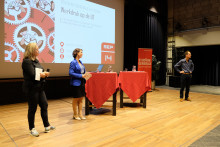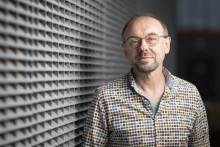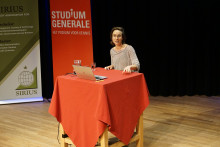‘In The Netherlands, more than ten per cent of employees work weekly more than ten hours overtime.’ With these statistics, presenter Peter Timmerman set the tone for the debate. The head of the Studium Generale moderated the discussion together with Maaike Platvoet, editor-in-chief of U-Today, and gave the three speakers time to speak one by one. This all happened in a well-filled Agora, where many staff members and one student were present in the audience.
High and low-hanging fruit
Steenbergen – professor, contact person of WOinActie and blogger about workload – stated before his presentation that he does not have a ‘set-in-stone vision’ on the problem, but that the theme is of great concern to him. He discussed ‘breathing space’ and ‘time to think’ for staff and symbolically divided the problems into the concept of high and low-hanging fruit. ‘And ban lunch meetings. I am very stern in that.’ He ended his presentation with a quote from a colleague, who said the following right after a holiday. ‘At the end of Saturday, I thought: If only I had spent more time working during my holiday.’
Machteld Roos, Vice-President of the Executive Board, acknowledged that the theme of workload can be seen as a multi-headed beast. Nationally, but also at the UT. ‘I support the noticeably ongoing movement from individual to team thinking. And let’s include young people and students in this subject as well.’ Roos expressed her hope that the UT community will continue to talk about workload openly and inclusively. She discussed absenteeism at the UT as well. ‘It is relatively low, but that can mean a lot. That we are doing well together, but also that there is hidden absenteeism.’
Mutual understanding
Workload is a theme that cannot be separated from human resources. That is why Hans Oeloff, director of Human Resources, gave a presentation as well. He said that workload was a topical theme when he began working at the university seven years ago. ‘What we do as HR is demand-driven, never supply-driven. I feel that there is a mutual understanding and that people of all backgrounds are in contact with each other to do something about this.’
Between the presentations of the three speakers, observations and questions came from the audience, after which there was room for an actual, sometimes fierce, debate. Lecturer Femke Nijboer questioned whether there is a taboo on the theme of student numbers. A theme which, according to her, hardly ever came up. According to Roos, there is no taboo on the growth in the number of students. ‘As long as that growth is not unbridled, but there is a social need for highly educated, technical people.’
Vacancies
Mathematics teacher and Uraad member Dick Meijer gave a fiery speech as a listener. ‘We are talking about a multi-headed beast, but instead of tackling the big head, we are just tackling the small heads. Absolutely nothing comes of the big plans. Why are vacancies not filled if there are millions left?’ A question that could count on Oeloff’s understanding. ‘And we also need more hands on deck, but it is difficult to get good people. That is why it is good to continue discussing this subject with each other.’
U-Today and Studium Generale will organize a follow-up on this first debate on workload in the course of the year. A second discussion will be especially for PhDs and a third meeting follows about study load and students.






